Filter by
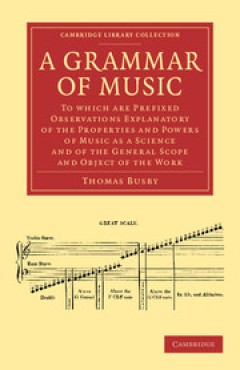
A Grammar of Music To which are Prefixed Observations Explanatory of the Pro…
The writer, composer and organist Thomas Busby (1754–1838) is best remembered for his highly entertaining Concert Room and Orchestra Anecdotes (1825), which paints a vivid picture of musical life at the time. The son of a coach painter, Busby was originally articled to the composer Jonathan Battishill but found the experience unrewarding. His compositions (many now lost) include songs, theatr…
- Edition
- -
- ISBN/ISSN
- 9781139833608
- Collation
- -
- Series Title
- Cambridge Library Collection - Music
- Call Number
- -
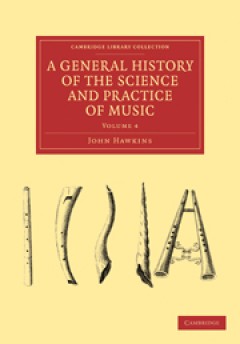
A General History of the Science and Practice of Music
Sir John Hawkins (1719–1789), lawyer, friend of Samuel Johnson and member of the Academy of Ancient Music, published his pioneering five-volume history in 1776 just after the first volume of Burney's. Hawkins' work suffered badly in the resulting competition between the two, partly because of his difficult personality, partly because of the scholarly style of the writing contrasting with Burn…
- Edition
- -
- ISBN/ISSN
- 9780511997549
- Collation
- -
- Series Title
- Cambridge Library Collection - Music
- Call Number
- -
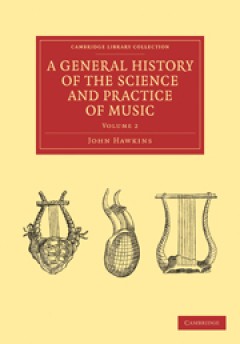
A General History of the Science and Practice of Music
Sir John Hawkins (1719–1789), lawyer, friend of Samuel Johnson and member of the Academy of Ancient Music, published his pioneering five-volume history in 1776 just after the first volume of Burney's. Hawkins' work suffered badly in the resulting competition between the two, partly because of his difficult personality, partly because of the scholarly style of the writing contrasting with Burn…
- Edition
- -
- ISBN/ISSN
- 9780511997525
- Collation
- -
- Series Title
- Cambridge Library Collection - Music
- Call Number
- -
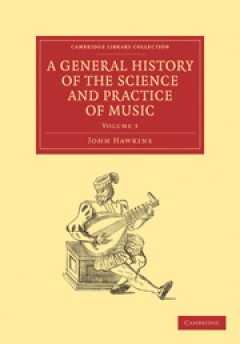
A General History of the Science and Practice of Music
Sir John Hawkins (1719–1789), lawyer, friend of Samuel Johnson and member of the Academy of Ancient Music, published his pioneering five-volume history in 1776 just after the first volume of Burney's. Hawkins' work suffered badly in the resulting competition between the two, partly because of his difficult personality, partly because of the scholarly style of the writing contrasting with Burn…
- Edition
- -
- ISBN/ISSN
- 9780511997532
- Collation
- -
- Series Title
- Cambridge Library Collection - Music
- Call Number
- -
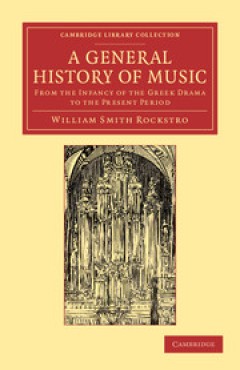
A General History of Music
A friend and pupil of Mendelssohn, the composer and author William Smith Rockstro (1823–95) was regarded as an expert on early music. He contributed articles on the subject to Sir George Grove's Dictionary of Music and Musicians as well as teaching counterpoint and plainsong at the Royal College of Music. His published output includes biographies of Handel (1883), Mendelssohn (1884) and the o…
- Edition
- -
- ISBN/ISSN
- 9781107300125
- Collation
- -
- Series Title
- Cambridge Library Collection - Music
- Call Number
- -
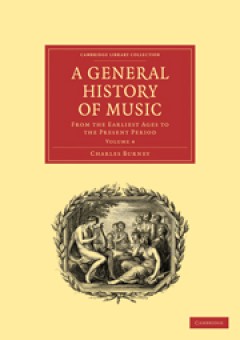
A General History of Music
Charles Burney (1726–1814), was the foremost music historian of his day. The General History, his most famous work, was published in four volumes between 1776 and 1789 and is still of great value today. Burney wanted to write something which would appeal to and inform the musician and the general reader. Research for the History was undertaken during two European tours, in 1770 and 1772, cons…
- Edition
- -
- ISBN/ISSN
- 9780511711220
- Collation
- -
- Series Title
- Cambridge Library Collection - Music
- Call Number
- -
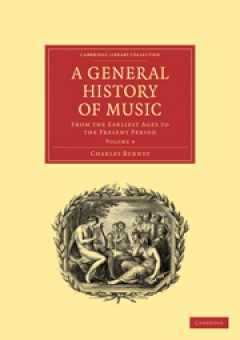
A General History of Music
Charles Burney (1726–1814), was the foremost music historian of his day. The General History, his most famous work, was published in four volumes between 1776 and 1789 and is still of great value today. Burney wanted to write something which would appeal to and inform the musician and the general reader. Research for the History was undertaken during two European tours, in 1770 and 1772, cons…
- Edition
- -
- ISBN/ISSN
- 9780511711206
- Collation
- -
- Series Title
- Cambridge Library Collection - Music
- Call Number
- -
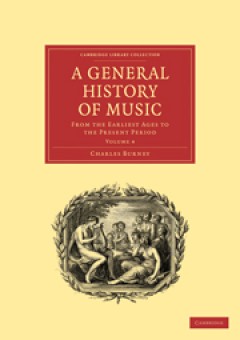
A General History of Music
Charles Burney (1726–1814), was the foremost music historian of his day. The General History, his most famous work, was published in four volumes between 1776 and 1789 and is still of great value today. Burney wanted to write something which would appeal to and inform the musician and the general reader. Research for the History was undertaken during two European tours, in 1770 and 1772, cons…
- Edition
- -
- ISBN/ISSN
- 9780511711237
- Collation
- -
- Series Title
- Cambridge Library Collection - Music
- Call Number
- -

A General History of Music, from the Earliest Times to the Present
The writer, composer and organist Thomas Busby (1754–1838) is best remembered for his highly entertaining Concert Room and Orchestra Anecdotes (1825), which paints a vivid picture of musical life at the time. The son of a coach painter, Busby was originally articled to the composer Jonathan Battishill, but found the experience unrewarding. His compositions (many now lost) include songs, theat…
- Edition
- -
- ISBN/ISSN
- 9781139833745
- Collation
- -
- Series Title
- Cambridge Library Collection - Music
- Call Number
- -

A General History of Music, from the Earliest Times to the Present
The writer, composer and organist Thomas Busby (1754–1838) is best remembered for his highly entertaining Concert Room and Orchestra Anecdotes (1825), which paints a vivid picture of musical life at the time. The son of a coach painter, Busby was originally articled to the composer Jonathan Battishill, but found the experience unrewarding. His compositions (many now lost) include songs, theat…
- Edition
- -
- ISBN/ISSN
- 9781139833752
- Collation
- -
- Series Title
- Cambridge Library Collection - Music
- Call Number
- -
 Computer Science, Information & General Works
Computer Science, Information & General Works  Philosophy & Psychology
Philosophy & Psychology  Religion
Religion  Social Sciences
Social Sciences  Language
Language  Pure Science
Pure Science  Applied Sciences
Applied Sciences  Art & Recreation
Art & Recreation  Literature
Literature  History & Geography
History & Geography